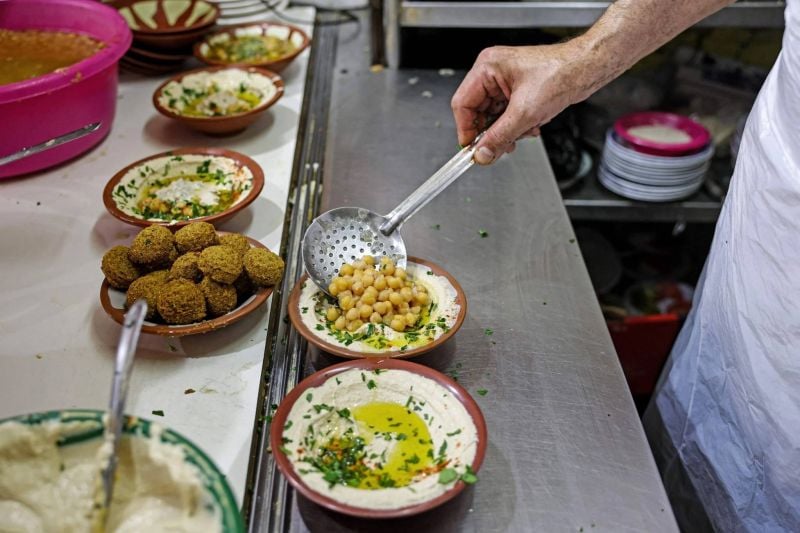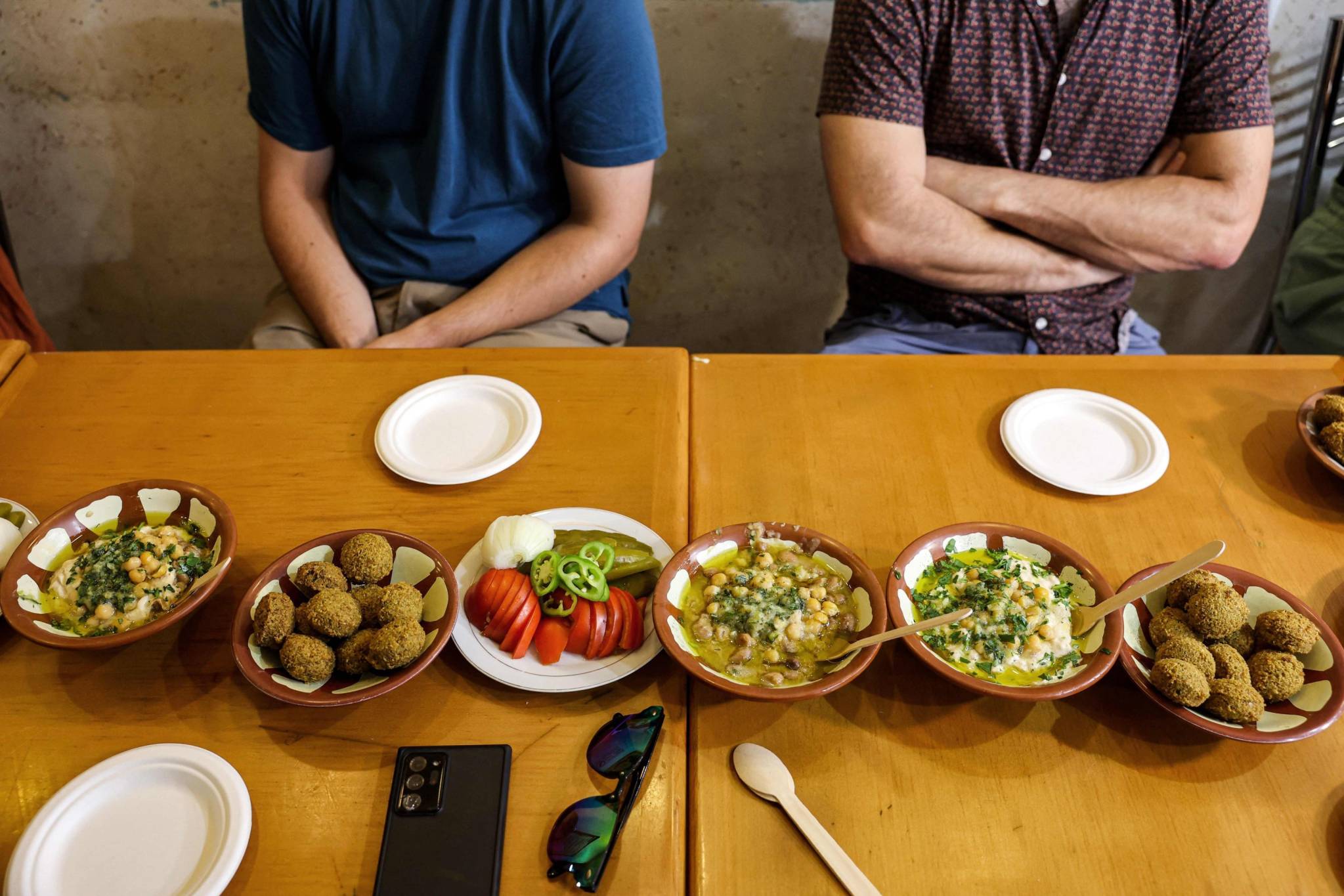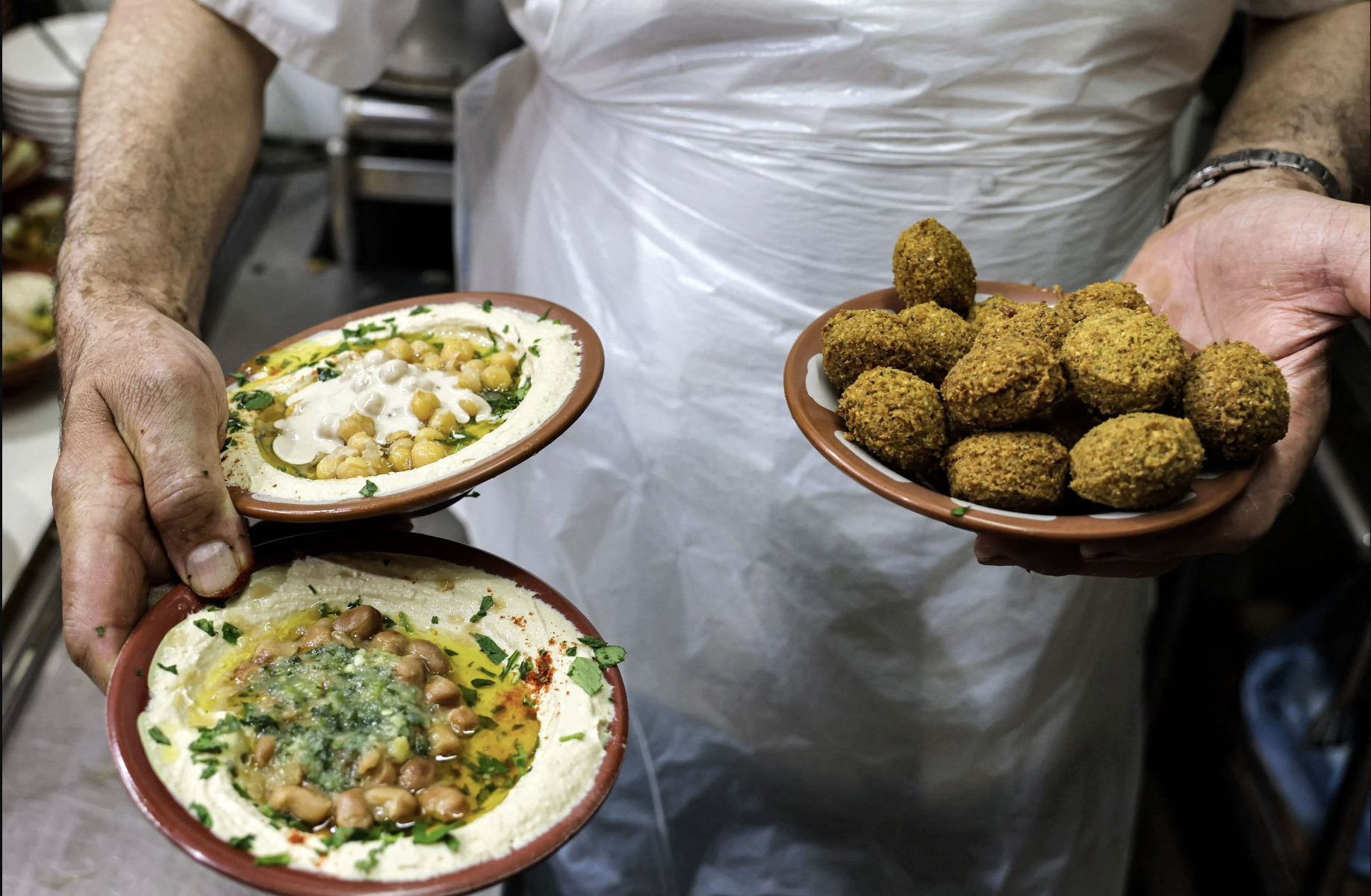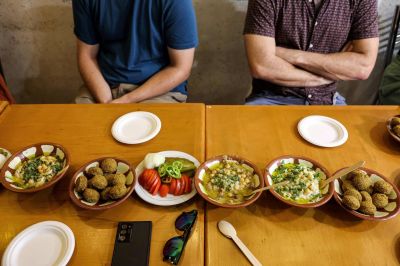
A cook prepares dishes of hummus and falafel at a restaurant in East Jerusalem, in the occupied West Bank, on July 26, 2022. (Credit: AFP)
After hummus, falafel and so many other flagship dishes of Palestinian and Levantine cuisine, knefeh nabulsi is the latest victim of appropriation by Israel.
This delicious dessert, which originated in Nablus and is named after the main ingredient — nabulsi cheese — has been incorporated into a more-than-dubious recipe developed by Pizza Hut Israel.
For Palestinian chef Fadi Kattan, the affront is threefold: "First against the knefeh, then against pizza... And then, against the taste!"
The flavor is as off-putting as it is bitter for Salma Serry, historian of Near Eastern cuisine. The Israeli pizza-knefeh fits perfectly into the definition of appropriation she offers on Sufra Kitchen, the online platform she created to decolonize regional cuisines:
"Appropriation [is the] inappropriate adoption of a group's food without giving it credit, especially for commercial gain. Example: Israeli restaurants profiting from falafel, knefeh or hummus without mentioning their original culture."
‘This chickpea puree is not bad!’
Yet, culinary appropriation is as common as it is trivialized in Israeli restaurants all over the world. Many media relay it with relish.
In 2019, the Haaretz newspaper wrote about "Shawarma, the iconic dish of Israeli street food." In 2017, American media outlet Thrillist asked: "Why is modern Israeli cuisine America's favorite?" while describing with gusto a dish of hummus with fresh vegetables.
Yet, a report on “Israeli flavors” broadcasted by France Culture in November 2022 raised the question: "Aren't they basically a mixture of Levantine flavors?”
 Customers of a restaurant sit in front of dishes of hummus and falafel in East Jerusalem, in the occupied West Bank, on July 26, 2022. (Credit: AFP)
Customers of a restaurant sit in front of dishes of hummus and falafel in East Jerusalem, in the occupied West Bank, on July 26, 2022. (Credit: AFP)
For chef Kattan, the case of hummus is emblematic of the broader problem:
"It was the very first dish appropriated by the Israelis as early as 1948. Originally, the Zionist project was marked by European-style colonialism that denied the Arabness of Palestine and its land. But when they went to eat at the homes of Palestinians who survived the Nakba — during which 580 Palestinian villages were razed to the ground — they said to themselves, ‘This chickpea puree is not bad!’”
Thus, hummus and other dishes that Palestinians share with their Levantine neighbors were gradually relabeled as Israeli, while the cuisines of Mizrahi Jews from Iraq, the Maghreb, or Yemen were spared.
“After being discriminated against, these Arab Jews gradually opened restaurants celebrating their cuisine. Strangely enough, the only culinary signboard you don't see in Israel is the Palestinian one," said Kattan, who recently opened his restaurants, Akub, in London and Fawda ("chaos") in Bethlehem.
"I don't mind if an Israeli chef cooks Palestinian food, but let them say it's Palestinian, just as they talk about cooking Moroccan, Polish or Tunisian cuisine.”
‘Taking and not giving back’
Salma Serry says she often hears denials of this culinary appropriation, defended as the natural spread of cuisine among different communities.
"Of course, food is meant to be shared. But when there is active violence that takes away a group's cultural identity and denies its heritage, its land and the food it produces while manipulating its history, then it becomes problematic,” she said. “In the specific case of Palestine, it's not about sharing; it's about taking and not giving back."
The culinary historian points out that many historically Palestinian dishes and ingredients are also present in Lebanon, Syria and Jordan, such as hummus, knefeh or labneh.
"But it is primarily the Palestinians who are under an existential threat to their culinary culture."
According to Sufra Kitchen, appropriation is just one of the many "forms of colonization of Palestinian food" alongside "control of resources," "restriction of freedom of movement" and "destruction of agricultural land."
 A cook shows dishes of hummus and falafel at a restaurant in East Jerusalem, in the occupied West Bank, on July 26, 2022. (Credit: AFP)
A cook shows dishes of hummus and falafel at a restaurant in East Jerusalem, in the occupied West Bank, on July 26, 2022. (Credit: AFP)
An ‘ancestral’ connection to the land
In 2012, a sketch video published by the Matteh Binyamin Regional Council — which represents illegal settlements in the West Bank — suggested in a humorous tone that olive oil is also Israeli.
The sketch shows an Israeli enjoying a plate of hummus with olive oil that Arab waiters say has been produced for "thousands of years." But instead of depicting Palestinian farmers, the video then shows Israeli settlers participating in the olive harvest and ends with a close-up of a bottle of Binyamin oil, labeled in Hebrew.
Thus, behind the need to appropriate Palestinian cuisine lies the desire for Israelis to justify a supposed ancestral link to a land they have only occupied since 1948.
"What better [to appropriate] than cuisine, which is synonymous with agriculture, gathering and a constant link to the land?” asked Kattan. “What could be better than saying, ‘I have been picking my olives here for hundreds of years?’ In reality, they are picked by Palestinians on land you stole from them!
Kattan explained that it is becoming increasingly difficult for Palestinian farmers to grow their own produce. The rising number of illegal settlements in the West Bank reduces the amount of land available for agriculture, and the settlements’ use of groundwater depletes the supply available to farmland. Additionally, roads that connect the settlements are reserved for the settlers, thus hindering freedom of movement for Palestinian farmers.
"At best, they have less land and water to cultivate. At worst, the settlers attack [Palestinean farmers] and burn their olive fields," said Kattan, who sources Palestinian produce for his restaurants.
"When people tell me that I preserve Palestinian cuisine, I reply that it's more the Palestinian farmers and Palestinian women who cook at home who do it."
World Heritage
In his restaurants, Fadi Kattan takes Palestinian recipes such as makloubeh or mansaf and gives them a modern twist to bring Palestinian culinary culture to a wider audience.
New inscription on the #IntangibleHeritage list from ???? ????: The knowledge, know-how & practices pertaining to the production & consumption of #couscous. An example of international cooperation!?
— UNESCO ?️ #Education #Sciences #Culture ?? (@UNESCO) December 16, 2020
Share your favourite couscous recipe & traditions?.https://t.co/irNpZS9lJQ pic.twitter.com/dWVldHFMS8
Culture, Salma Serry reminds us, is not only based on recipes and ingredients.
"Knefeh, for example, is not eaten like any other dessert. In Palestine, it is eaten during celebrations, such as getting a new job or the release of a political prisoner. Eating it hot in the street, deftly cut by an artisan, is part of the culture,” Serry said. “It is this whole context that is important to remember when talking about Palestinian food."
Palestinean food is a unique cultural element threatened by Israeli appropriation but could find salvation in the similarities it shares with Levantine cuisines, according to Fadi Kattan.
Couscous is registered with UNESCO's list of intangible heritage, attributed to Morocco, Algeria, Mauritania and Tunisia.
“To avoid appropriation, Syrians, Lebanese, Palestinians and Jordanians should do the same for the recipes they share,” said Kattan.
This article was originally published in French in L'Orient-Le Jour.
